- Home
- Peter Matthiessen
Killing Mister Watson
Killing Mister Watson Read online
Killing Mister Watson
Peter Matthiessen
Drawn from fragments of historical fact, Matthiessen's masterpiece brilliantly depicts the fortunes and misfortunes of Edgar J. Watson, a real-life entrepreneur and outlaw who appeared in the lawless Florida Everglades around the turn of the century.
Peter Matthiessen
Killing Mister Watson
The first book in the Watson trilogy series, 1990
TO THE PIONEER FAMILIES OF SOUTHWEST FLORIDA
In a six-year search, I have had great help from at least one member of almost every family mentioned, and am grateful to dozens of native Floridians for their time and courtesy and help, including a few who have not survived to see the finished book-the late Ruth Ellen [1] Watson, Rob Storter, Robert Smallwood, Sammie Hamilton, and Beatrice Bronson, three of whom offered childhood memories of Mister Watson.
Special gratitude is due to Larry (Watson) Owen, who made a great variety of contributions; also to Mary Ruth Hamilton Clark and Ernie House. My sincere thanks to Frank and Gladys (Wiggins) Daniels, Marguerite (Smallwood) and Fred Williams, Nancy (Smallwood) and A. C. (Boggess) Hancock, Bert (McKinney) and Julia (Thompson) Brown, Loren "Totch" Brown, Bill and Rosa (Thompson) Brown, Louise Bass, Paul Duke, Doris Gandees, Preston Sawyer, Buddy Roberts, Edith (Noble) Hamilton.
I am also indebted to the researches, writings, and good counsel of the historian Dr. Charlton W. Tebeau, author of Man in the Everglades; Collier County: Florida's Last Frontier; The Story of the Chokoloskee Bay Country, and other excellent works on pioneer Florida.
None of these friends and informants are responsible for my interpretations of their accounts of the life and times of their own families and others, for all of which I accept full responsibility.
AUTHOR'S NOTE
A man still known in his community as E.J. Watson has been reimagined from the few hard "facts"-census and marriage records, dates on gravestones, and the like. All the rest of the popular record is a mix of rumor, gossip, tale, and legend that has evolved over eight decades into myth.
This book reflects my own instincts and intuitions about Mister Watson. It is fiction, and the great majority of the episodes and accounts are my own creation. The book is in no way "historical," since almost nothing here is history. On the other hand, there is nothing that could not have happened-nothing inconsistent, that is, with the very little that is actually on record. It is my hope and strong belief that this reimagined life contains much more of the truth of Mister Watson than the lurid and popularly accepted "facts" of the Watson legend.
***
PROLOGUE: OCTOBER 24, 1910
Sea birds are aloft again, a tattered few. The white terns look dirtied in the somber light and they fly stiffly, feeling out an element they no longer trust. Unable to locate the storm-lost minnows, they wander the thick waters with sad muted cries, hunting signs and seamarks that might return them to the order of the world.
In the hurricane's wake, the labyrinthine coast where the Everglades deltas meet the Gulf of Mexico lies broken, stunned, flattened to mud by the wild tread of God. Day after day, a gray and brooding wind nags at the mangroves, hurrying the unruly tides that hunt through the broken islands and twist far back into the creeks, leaving behind brown spume and matted salt grass, driftwood. On the bay shores and down the coastal rivers, a far gray sun picks up dead glints from windrows of rotted mullet, heaped a foot high.
From the island settlement on the old Indian mound called Chokoloskee, a baleful and uneasy sky out toward the Gulf looks ragged as a ghost, unsettled, wandering. The sky is low, withholding rain, and vultures on black-fingered wings tilt back and forth over the broken trees. At the channel edge, where docks and pilings, stove-in boats, uprooted shacks litter the shore, odd pieces torn away from their old places have been strained from the flood by the limbs over the water. A clothesline flutters in the trees; thatched roofs are spun onto their poles like old straw brooms; frame buildings sag. In the dank air a sharp fish stink is infused with corruption of dead animals and blackened vegetables, of excrement in overflowing pits from which shack privies have been washed away. Pots, kettles, crockery, a butter churn, tin tubs, buckets, salt-slimed boots, soaked horsehair mattresses, and ravished dolls are strewn across the pale killed ground.
A lone gull picks disconsolate at the softening mullet along shore, a dog barks without heart at so much silence.
A figure in mud-fringed calico, calling a child, stoops to retrieve a Bible, then wipes wet grime from the Good Book with pale dulled fingers. She straightens, turning slowly, staring toward the south. From the wall of mangroves far off down the bay, the drum of the boat engine comes and goes, then comes again, a little louder.
"Oh, Lord," she whispers, half-aloud. "Oh no, please no, sweet Jesus."
Along toward low gray-yellow twilight, Postmaster Smallwood, on his knees beneath his store, is raking out the last of his drowned chickens. What the hurricane has left of Smallwood's dock-a few poor pilings-sticks out at angles off the end of the spoil bank where he'd dug his canal for Indian canoes. From there the pewter water spreads away to the black walls of mangrove on all sides.
He crouches in the putrid heat. Voices are whispering, as at a funeral. One pair of bare feet, then another, pass in silence on the way down to the landing. He knows his neighbors by their gait and britches. Over the whispering, over short breaths, comes the drumming of the motor, softened by distance, east through Rabbit Key Pass from the Gulf of Mexico. In a shift of wind, the pot-pot-pot comes hard as a pulse, as if he heard his heart for the first time.
Three days before, when that boat had headed south, all ten families on the island watched it go. Smallwood was the only man to wave, but he, too, prayed that this would be the end of it, that the broad figure at the helm, sinking into darkness at the far low line of trees, would disappear forever from their lives. Said Old Man D.D. House, "He will be back." The House clan lives one hundred yards away, east of the store. Ted Smallwood sees his father-in-law's black Sunday boots descend the Indian mound, with Bill House and Young Dan and Lloyd barefoot behind. Calling his sister, Bill climbs the porch and enters the store and post office, which has the Smallwood family rooms upstairs. Feet creak on the pine floor overhead.
In the steaming heat, in the onset of malaria, Smallwood feels so sickly weak that when his rump emerges and he tries to stand, blood thumps his temples and the trees go black. He is a big man and bangs heavily against the wall of his frame house, causing his wife, somewhere inside, to cry out in alarm. Slowly he straightens, arches his stiff back. He takes a deep and dreadful breath, gags, coughs, and shudders. He hawks the sweet taste of chicken rot from his mouth and nostrils.
"Look what come crawling out! Ain't that the postmaster?"
The postmaster's spade, jammed at the black earth by way of answer, grates on old white oyster shells of the huge midden. Again he jams it, and it glances off a root. The House boys laugh.
"Keep that spade handy, boy. Might gone to need it."
Ted Smallwood says, "Got four rifles there, I see. Think that's enough?"
The old man stops to contemplate his son-in-law. Daniel David House has silver in his brows and his mustache juts into ax-head sideburns. Though he wears no collar underneath his beard, he is dressed as if for Sunday, in white shirt, shiny black frock coat, wiped boots, and stiff black pants hauled high by galluses. He stands apart from the sandy, slow-eyed boys delivered him by the former Ida Borders.
"Where's his missus, then?" the old man says.
"She's right inside here with her young 'uns. With your daughter and granddaughters, Mr. House." When the old man grunts and turns away, Ted's voice goes higher. "Them women and children gone to
have 'em a good view!"
Henry Short, expressionless, moves past, holding his rifle down along his leg.
"You, too?"
"Leave Henry be," says Bill House, coming out. Bill House is thirty, a strong florid man creased hard by sun.
Mamie Smallwood has followed Bill outside. When her brother turns to calm her, the plump young woman cries, "Let me alone!" She weeps. "Where is her little boy? He's only three!"
Old Man Dan shakes his big head and keeps on going, refusing to listen anymore. Young Dan and Lloyd follow him close, down toward the shore.
A young woman comes around the house. "Mr. Smallwood? Please? Tell me what's happening?" When the postmaster stands mute, she cries, "Oh Lord!" and hurries off again. She is still calling her boy.
The island men are gathering, twenty or more. All have shotguns or rifles.
Charlie T. Boggess, who twisted his ankle in the hurricane, is limping. "All right, woman, all right!" he shouts, to his wife's calling. To the postmaster he says, "Why couldn't he keep right on going? To Key West!"
Ted says, "Don't hear Ethel hollering? You best hobble home, take care that ankle."
Isaac Yeomans, coming by, says, "Key West? Nosir! That feller ain't the kind likes to back up." Isaac is fiery with drink; he looks almost cheered up by what the others dread. "You recall Sam Lewis, Ted? At Lemon City?"
Smallwood nods. "They lynched Sam Lewis, too."
Bill House stops on the steps. "This ain't no mob!"
"Don't think so?" The postmaster pitches his voice toward Bill's father. "What if he's just coming back here to pick up his family and keep right on going?"
Bill House says, "Keep right on going, Ted, just like you say, and do the same thing somewheres else."
"Mr. Smallwood? Have you seen little Addison?"
The men turn their backs to the young woman and stare away toward the south. The oncoming boat is a small dark burr in the pewter light of Chokoloskee Bay.
Henry Short leans his 30-30 Winchester into a fork of the big fish-fuddle that the hurricane has felled across the clearing. The gun is hidden when he leans against the tree, and his arms are folded as if in sign that none of this is any of his business.
Twilight gathers behind the coming boat. The armed men stand half-hidden in the undergrowth, too tense to slap at the mosquitoes. In the dusk of a dark day, in the tree shadow, the postmaster can no longer make out faces beneath the old and broken hats. His neighbors seem anonymous as outlaws.
Not slowing, the boat winds in among the oyster bars. The helmsman stands in silhouette, his broad hat forward on his head.
Isaac Yeomans breaks his shotgun and sights down the barrels, pops two shells in, sets his felt hat. "Seems like you ought to throw in with us, Ted." Isaac is gazing out over the water. "We're in friendship with him too. We don't care for this no more'n you do."
"He pays his bills, plays fair with me. I ain't got a single thing agin him." Smallwood speaks urgently to Yeomans and to Boggess, who have been his friends for fifteen years. "You boys never had no trouble with him, and you can't hit nothing anyway. Put them damn guns down."
Others hesitate beside the store, as if loath to go down to the landing. They have worn the same shirts for a week, they are scared and cranky, they are anxious to involve Ted Smallwood. At the very least, the postmaster's participation might make what must happen more respectable. If no one is innocent, who can be guilty?
Storm refugees from Lost Man's River stand back by the store porch, a hundred yards from the boat landing.
One calls, "Looks like y'all are fixing to gun him down." Henry Thompson is a tall and sunworn man, lank as a dog.
Another man nods urgently, clearing his throat. "Thought you fellers was aiming to get deputized! Thought you was aiming to arrest him!"
"Won't let hisself get arrested," Bill House says. "Men here found that out the other day."
"Best if nobody hangs back!" calls Old Dan House.
One man says, "I believe Ted knows what must be done as good as we do. He just don't want no part of it." Another cackles, "Why, hell, Ted, bushwhacking ain't nothing to be scared of! Not with his one against two dozen!"
"Maybe I ain't scared the way you think. Maybe I'm scared of killing in cold blood."
"He ain't scared of cold blood, Ted. Colder the better."
"Ain't nobody proved that in a court of law!"
"Ain't no law down here to prove it by."
Behind the men skulk ragged boys with slingshots and single-shot.22s. Shouted at, they slink into the trees and circle back, bright-eyed as coons.
In his old leaf-colored clothes, in the brown shadows at the wood edge, Henry Short has sifted in against the tree bark like a chuck-will's-widow shuffling soft wings. He seems intent on the white bow wave where the dark boat parts the gray chop of the channel, and the rifle-fire pot-pot-pot, loud and louder. The silhouette of the lone boatman rises slowly on the evening sky.
The women are calling from the wood. Old Man Dan shouts to his son-in-law, "If you're his friend, go find his little feller!"
He circles through the wind-stripped trees. The wood is hushed, the last birds mute, the dogs gone still. Only mosquitoes are abroad, keening in the twisted gumbo-limbos.
He calls and calls.
A razorback hog grunts abruptly, once, in the startled silence.
The young mother follows him back to the house and goes inside. In white aprons, behind the salt-dark screen, the women loom like ghosts. Neither weeps. Their little daughters tug softly at their skirts. The children's eyes stare toward the boat over sucked thumbs.
Smallwood pushes past, indoors, not sure where he is headed. His wife is gripping the hand of the boy's mother. "Ought to kept him home," he says. When he bangs his lantern, Mamie raises a finger to her lips, as if the man out in the boat might hear.
"Daddy's the one behind this, ain't he?" she whispers. "Bill and Dan, too!"
Smallwood slaps a mosquito, lifts his fingers, investigates the blood. "Light that smudge," he says. Little Thelma runs to the crumpled bucket of black mangrove charcoal damped with earth.
He gazes at his Mamie Ulala, ignoring the young woman, who appears entranced. He says, "They're all behind it. All but the men from Lost Man's."
This dark day has been coming down forever. Even the young woman, in her pale foreboding, seems to know this. The day is late, and a life runs swiftly to its end.
"They want an end to it," he mutters.
Little Thelma and her friend Ruth Ellen stand in the corner, guarding the toddlers from something scary. Ruth Ellen's mother clutches Baby Amy, born five months before down at Key West. "Ad," she whispers to the missing boy. "Oh, please."
The motor dies, in a long wash of silence. "Daddy," Thelma says, starting to whimper. When the postmaster takes her up into his arms, she sucks her thumb. Beside himself, he thrusts her at her mother and follows the young woman back outside. He cannot stop yawning.
Seen through the broken branches, in the onshore wind, the launch coasts down on Smallwood's landing, just west of where the dock had been before the storm. Ted's heart pounds so that the boatman must surely feel it and take warning, must sense the islanders in the dark trees.
In the last light the postmaster sees little Addison hid in the sea-grape, spying on all those grown-up men with guns. Smallwood's voice breaks when he calls the boy, and goes unheard. Hurrying down the steps, he does not call again.
What had he feared? That his neighbors would denounce his call as a shout of warning?
Warned or not, the man would come in anyway.
Now Henry Short glides like a shadow from the trees, crossing behind the men, down to the shore. He wades without a splash into the water, just to the right of Bill House and Bill's father.
A suck and wash as the bow wave slaps ashore. Time stops, spun upward in a vortex. Smallwood's heart caroms, his hands rise to his ears.
The boat stem crunches old dead mollusks. Silence.
The e
arth turns. A quiet greeting, an exchange of voices. The men drift forward, spreading out along the water. Smallwood gasps for breath. With the day of reckoning unbearably deferred, the postmaster's relief is mixed, without elation.
Soon Mamie and her friend venture outside. They talk and smile to ease their nerves, starting down the little slope toward the water.
A twig snaps and the twilight stiffens. A hard shift, the whip crack of a shot, two shots together. There is time for an echo, time for a high shriek, before the last evening of the old days in the Islands flies apart in a volley of wild fire.
The young woman stands formally before his house, as for a picture, brown dress darkened by the dusk, face pale as salt.
Mamie runs to her, but it is she who takes the sobbing Mamie to her bosom, strokes her hair, regards the postmaster over his wife's shoulder without the mercy of a single blink. She appears calm. It is Mamie who has shrieked; he can still hear it. He wanders toward them, feeling weak and shy.
Mamie twists away from him, mouth working. In a low and awful voice she says, "I'm leaving! I am leaving this godforsaken place! I'm leaving!" The children stare. He shoos the little girls inside, to the staccato of boys' hoots and scared dogs barking. When little Thelma whines, he shakes her hard. "Inside, I said!" At the fury of his voice, her face disintegrates, she runs into the house.
The young woman goes to her little boy, who has tripped and fallen in his wailing flight and has patches of hurricane mud daubed on his knees. She pulls him to her, as if away from the armed men, who are milling in the dark like one great animal. Some turn to stare.
In a moment, she will crawl under the house, dragging her brood into the chicken slime and darkness.
"No, Lord," she whispers, as the terror overtakes her.
"Oh, dear God," she moans.

 Lost Man's River: Shadow Country Trilogy
Lost Man's River: Shadow Country Trilogy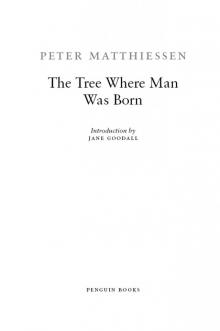 The Tree Where Man Was Born
The Tree Where Man Was Born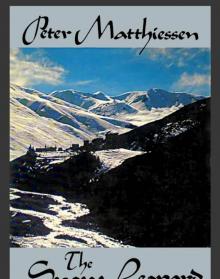 The Snow leopard
The Snow leopard Sand Rivers
Sand Rivers The Cloud Forest
The Cloud Forest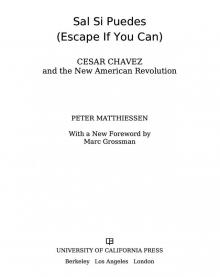 Sal Si Puedes (Escape if You Can)
Sal Si Puedes (Escape if You Can)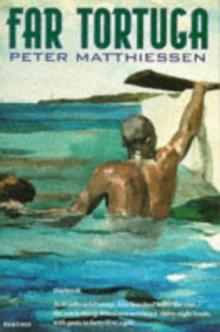 Far Tortuga
Far Tortuga Men's Lives
Men's Lives On the River Styx: And Other Stories
On the River Styx: And Other Stories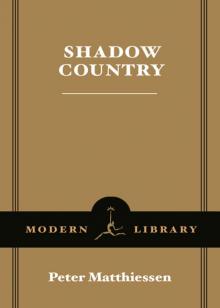 Shadow Country
Shadow Country At Play in the Fields of the Lord
At Play in the Fields of the Lord Lost Man's River
Lost Man's River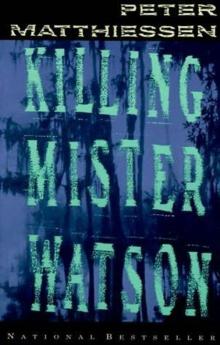 Killing Mister Watson
Killing Mister Watson On the River Styx
On the River Styx